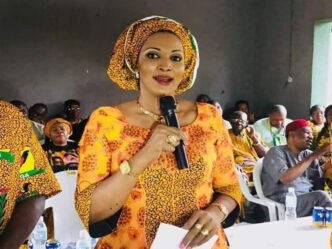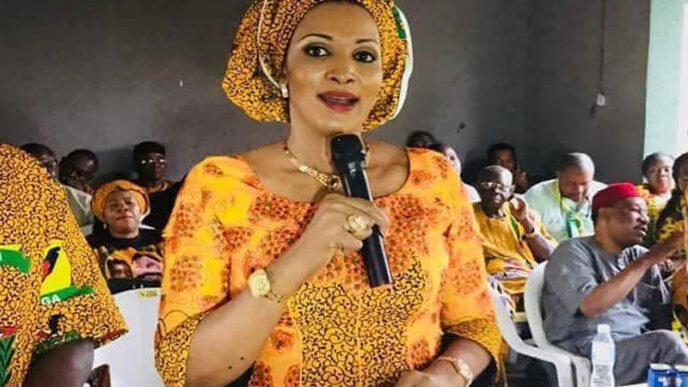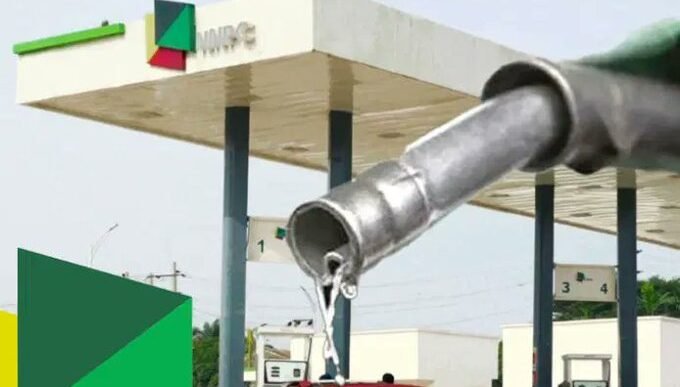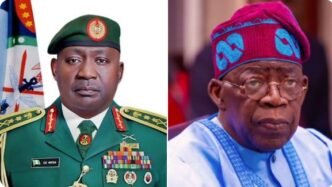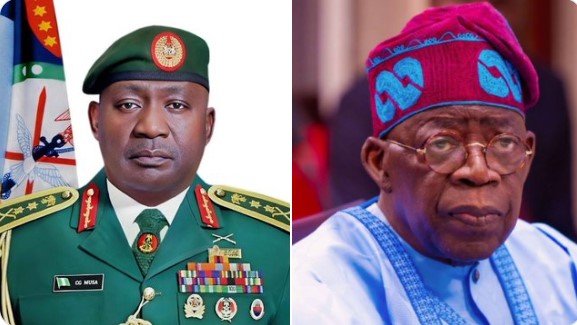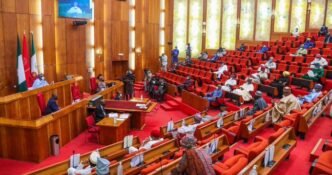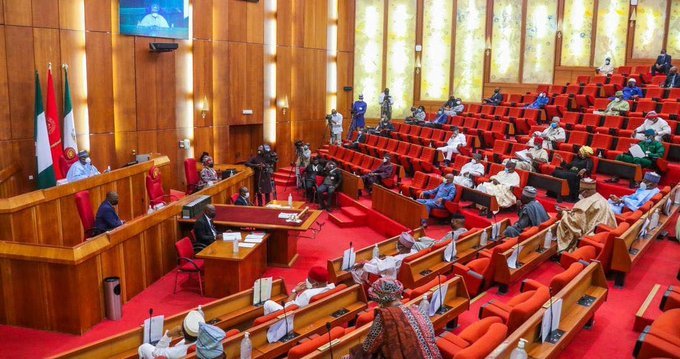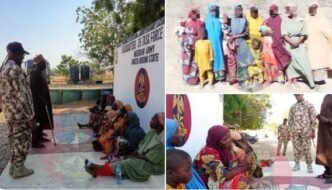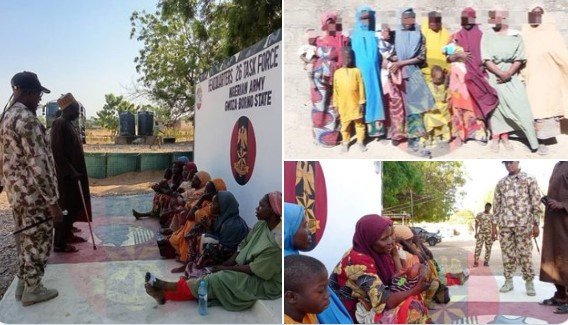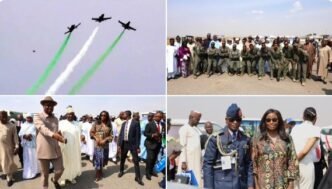ABUJA / BISSAU — November 27, 2025 — Former Nigerian President Goodluck Jonathan is among dozens of African dignitaries and international observers currently stranded in Guinea-Bissau after the country’s military abruptly announced that it had taken full control of the government. The takeover occurred just hours before the electoral commission was expected to release provisional results from the hotly contested presidential election held on November 23.
Jonathan, who was in the country as part of a joint African Union (AU), ECOWAS, and West African Elders Forum (WAEF) election observation mission, has been unable to leave following the closure of all land, air, and sea borders by the country’s new military junta.
Coup Announced as Election Results Were Imminent
Tensions escalated on Wednesday when a group of senior military officers appeared on national television in Bissau, declaring that they had dissolved all state institutions and formed a new governing structure known as the “High Military Command for the Restoration of Order.” The military said it had assumed control to prevent what it described as a plot by politicians and criminal networks to manipulate the presidential election results.
Earlier in the day, heavy gunfire was reported near key government installations, including the presidential palace and the headquarters of the national electoral commission. Troops were deployed across major intersections in the capital, creating scenes of panic among residents and widespread uncertainty.
The military also imposed a nationwide curfew, instructed citizens to remain indoors, and shut down the country’s main international airport. As a result, flights were halted, leaving observers, diplomats, aid workers, and other foreign nationals stranded.
Goodluck Jonathan and Other Observers Unable to Leave
Goodluck Jonathan had traveled to Bissau as part of a 36-member delegation tasked with assessing the credibility of the elections. Members of the observer team were scheduled to depart the country after completing their post-election briefings, but the sudden military takeover disrupted all travel plans.
Sources confirmed that Jonathan and other members of the delegation are safe and staying in secured hotels but cannot leave due to the closure of the airport and the military’s strict control of movement.
Reports indicated that several observers rushed to the airport shortly after news of the coup broke, but they were turned back after discovering that flights had been grounded and the facility shut down.
The joint observer mission issued a condemnation of the coup, describing it as a “direct assault on constitutional rule and the will of the voters.” The group called on the junta to immediately restore civil authority and release any election officials detained during the takeover.
Nigeria Reacts: Government Urged to Bring Jonathan Home
In Nigeria, the situation has sparked urgent concern among lawmakers, diplomats, and citizens. The House of Representatives held an emergency session to discuss Jonathan’s predicament and passed a resolution calling on the Federal Government to act swiftly.
Members of the House described Jonathan’s situation as a matter of national priority and urged the Ministry of Foreign Affairs and the Nigerian military to explore all diplomatic and security options to ensure his speedy evacuation.
Government sources indicated that Nigeria is already engaging with ECOWAS, the African Union, and other partners to secure Jonathan’s safe return. A multinational effort involving security agencies from the region is reportedly being prepared in case an evacuation becomes necessary.
However, officials emphasized that both Jonathan and other observers remain safe and that discussions are underway with Guinea-Bissau’s military authorities to guarantee their security and eventual departure.
Election Crisis Triggered Political Breakdown
Prior to the coup, Guinea-Bissau’s presidential election had already generated significant tension. Both leading candidates — the incumbent president Umaro Sissoco Embaló and his main challenger Fernando Dias — had claimed victory even though the electoral commission had not released any results.
The commission was reportedly preparing to publish the provisional tally when military officers stormed the capital and announced their takeover.
The military accused unnamed politicians of colluding with drug traffickers to alter results, echoing long-standing concerns about corruption and organized crime in the country. Guinea-Bissau is widely known as a key transit route for international drug cartels, and the accusation has further complicated the political landscape.
Condemnation from Across Africa and Beyond
The coup has drawn strong criticism from regional organizations and international partners. ECOWAS expressed deep concern over the military’s action and called for an immediate return to democratic governance. The African Union also condemned the overthrow, warning that unconstitutional changes of government threaten peace and stability across the continent.
International observers noted the troubling pattern of military takeovers in West Africa in recent years and warned that Guinea-Bissau’s coup could further weaken democratic norms in the region.
Foreign governments have advised their citizens to remain indoors, avoid large gatherings, and comply with directives issued by local authorities until the situation stabilizes.
Guinea-Bissau’s Troubled Political Past
Guinea-Bissau has struggled with political instability for decades. Since gaining independence in 1974, the country has experienced multiple coups, attempted coups, military mutinies, and frequent political crises.
Efforts by regional bodies, particularly ECOWAS, have helped stabilize the country in recent years — but critics say the underlying issues of corruption, weak institutions, and the influence of drug trafficking syndicates remain unresolved.
The 2025 election was widely viewed as an opportunity for the country to strengthen its democratic foundations. Instead, the sudden coup has plunged the nation back into crisis and raised fears of prolonged instability.
What Happens Next? Uncertainty Deepens
As of Thursday morning, the military junta had not announced a transition timetable or indicated whether it would resume the electoral process. Key members of the electoral commission were reportedly detained or missing, and political leaders remained unreachable.
Regional leaders are expected to hold emergency consultations to decide on possible sanctions or diplomatic interventions.
Meanwhile, the priority for Nigeria is ensuring Jonathan’s safe return. Diplomats remain hopeful that discussions with the junta will yield a peaceful solution allowing foreign observers to depart the country.
Security analysts, however, warn that evacuation efforts could become more complicated if internal conflict escalates in Bissau or if the military becomes fractured.
A Human and Diplomatic Crisis
For Goodluck Jonathan and the other observers, the situation has turned their routine diplomatic duty into an unexpected international crisis. Their confinement underscores the risks faced by election monitors who volunteer to support democratic processes in politically volatile nations.
For the people of Guinea-Bissau, the coup represents another setback in their quest for political stability and peaceful governance. Many citizens who cast their votes just days earlier are now left in limbo, unsure whether their voices will ever be heard.
Conclusion
The military takeover in Guinea-Bissau and the stranding of former Nigerian President Goodluck Jonathan highlight once again the fragility of democratic institutions in parts of West Africa. As the world watches closely, the coming days will determine whether the crisis can be resolved peacefully — and whether Guinea-Bissau will return to democratic rule or descend deeper into instability.
Nigeria’s government and regional partners are working to ensure Jonathan’s safe exit, but the fluid nature of the situation means his return is not yet guaranteed. For now, all eyes remain on Bissau as diplomatic efforts continue.



